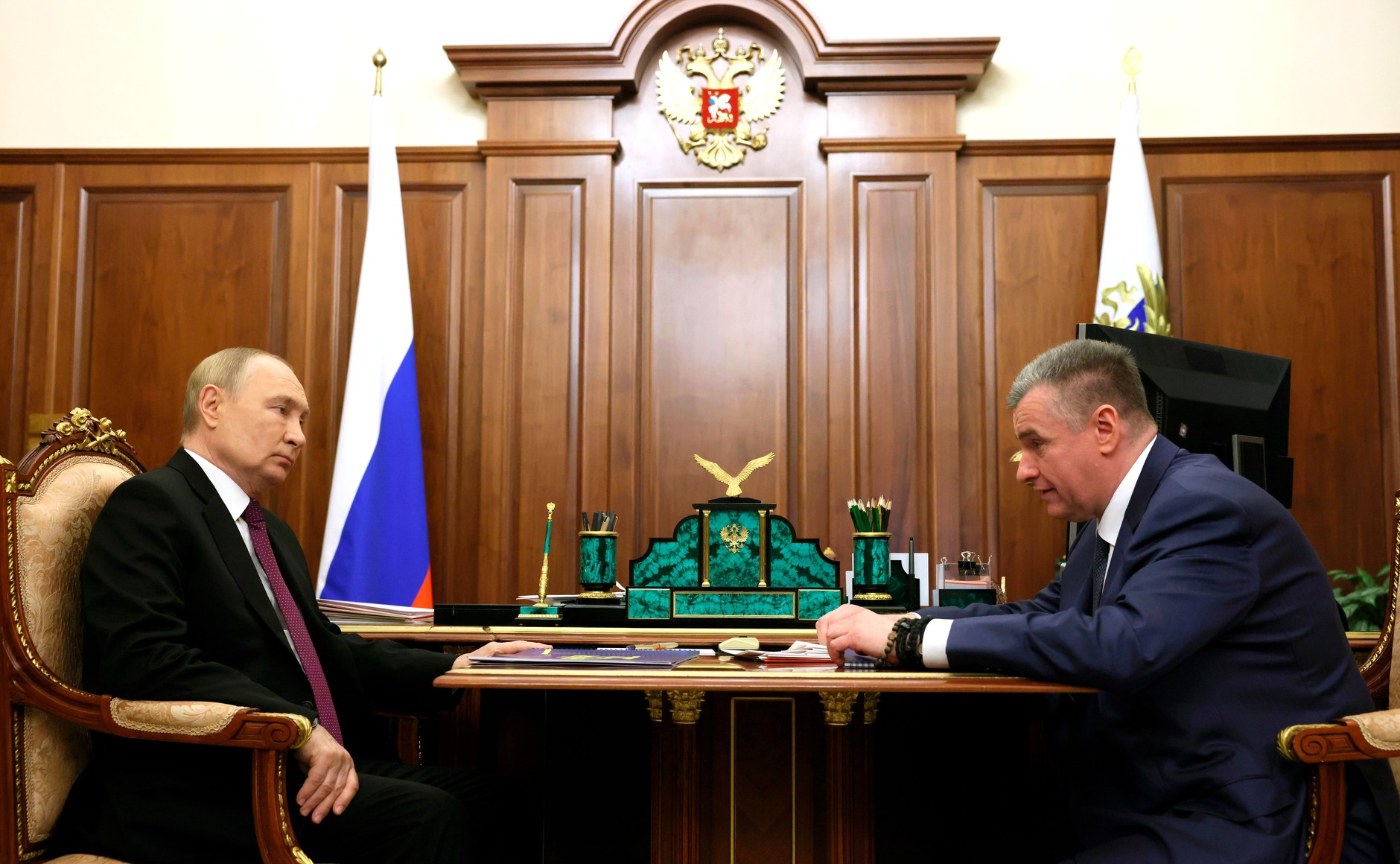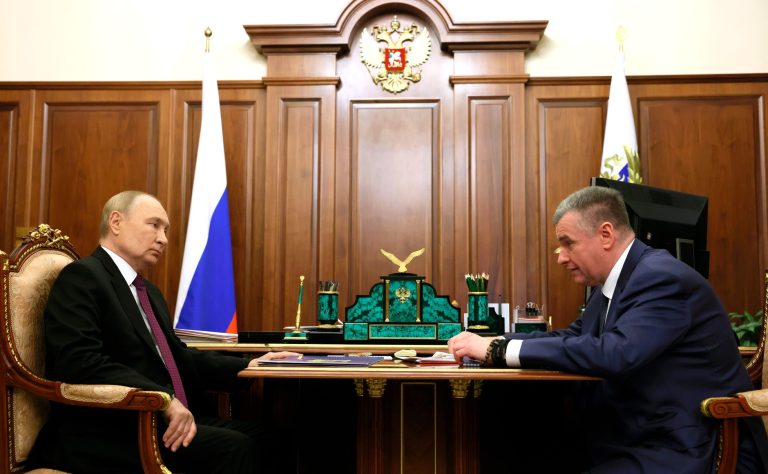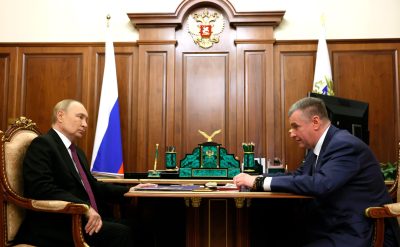Tomáš Madleňák (ICJK)
Photo: Kremlin.ru 2025-06-25
Tomáš Madleňák (ICJK)
Photo: Kremlin.ru 2025-06-25
The “James Bond-like” Russian Duma politician Leonid Slutsky and his Russian Peace Foundation helped arrange the Moscow visit of David Lindtner, a close ally to and advisor of Robert Fico, our investigation has found. Slutsky and his foundation have close ties to the GRU—and routinely pass information about their guests to the agency’s European espionage department.
In March 2025, a close ally of Slovak Prime Minister Robert Fico appeared in Moscow, despite having no previously known connections to Russian affairs. David Lindtner rose to prominence as Fico’s defense lawyer in his abuse of power and criminal group case, as well as in cases involving other Fico allies. In footage posted from their Russia trip by Ľuboš Blaha, a Smer deputy chairman and MEP known for his pro-Russian views, Lindtner is also present.
According to an investigation by VSquare and the Investigative Center of Ján Kuciak (ICJK), Lindtner’s trip to Moscow was facilitated by controversial Russian Duma member Leonid Slutsky. A successor to the ultranationalist Vladimir Zhirinovsky, Slutsky has led the Liberal Democratic Party of Russia (LDPR) since 2022. Multiple investigations and publicly available information show that both Slutsky’s inner circle and the LDPR faction maintain close ties to the GRU, Russia’s military intelligence service.
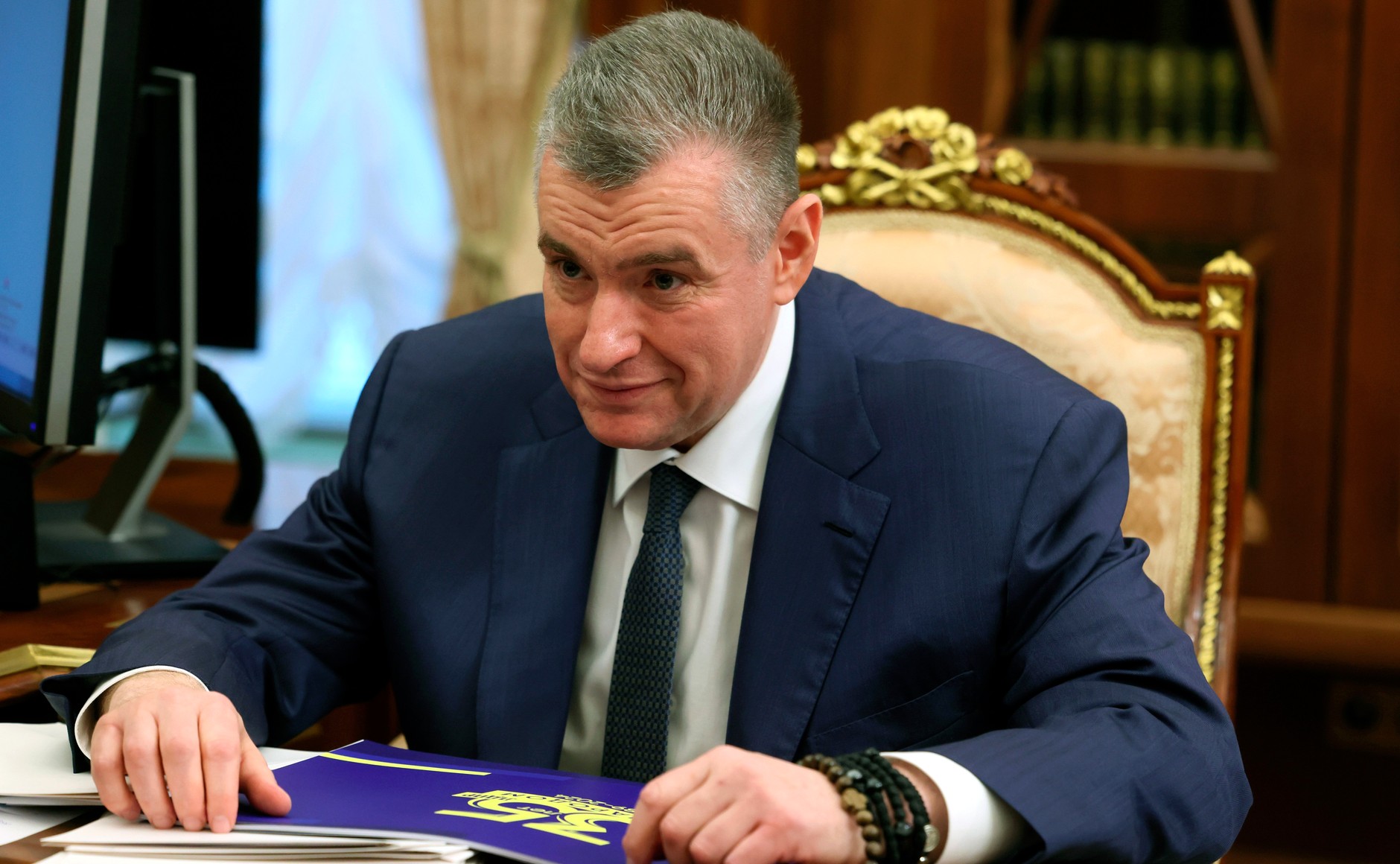
Leonid Slutsky in Russian President Vladimir Putin’s office. Source: Kremlin.ru
Among the LDPR members is Andrey Lugovoy, a Duma deputy wanted by British authorities in connection with the 2006 assassination of FSB defector Alexander Litvinenko, who was poisoned with polonium-laced tea. Meanwhile, Slutsky himself was reportedly “romantically involved” with Maria Khodynskaya-Golenishcheva, a GRU spy also known as Maria Konovalova, according to The Insider.
We obtained a copy of the visa request letter for Lindtner’s Moscow trip, which was sent by Leonid Slutsky to the Russian Embassy in Bratislava on February 21, 2025. The letter stated that the purpose of Lindtner’s visit was “participation in negotiations regarding the implementation of humanitarian and charitable programs and projects of the Russian Peace Foundation.” It is worth noting that members of the board of the Russian Peace Foundation include Patriarch Kirill—a former KGB agent and outspoken supporter of the full-scale invasion of Ukraine. The pro-Kremlin Russian Peace Foundation is led by Slutsky himself.
Slutsky’s visa request letter added that Lindtner would receive “material, medical, and housing support,” as well as “timely registration at the place of stay with the Main Directorate for Migration Affairs of the Ministry of Internal Affairs of Russia.” Slutsky requested the issuance of a double-entry visa for Lindtner for the period from February 24 to May 24, 2025.
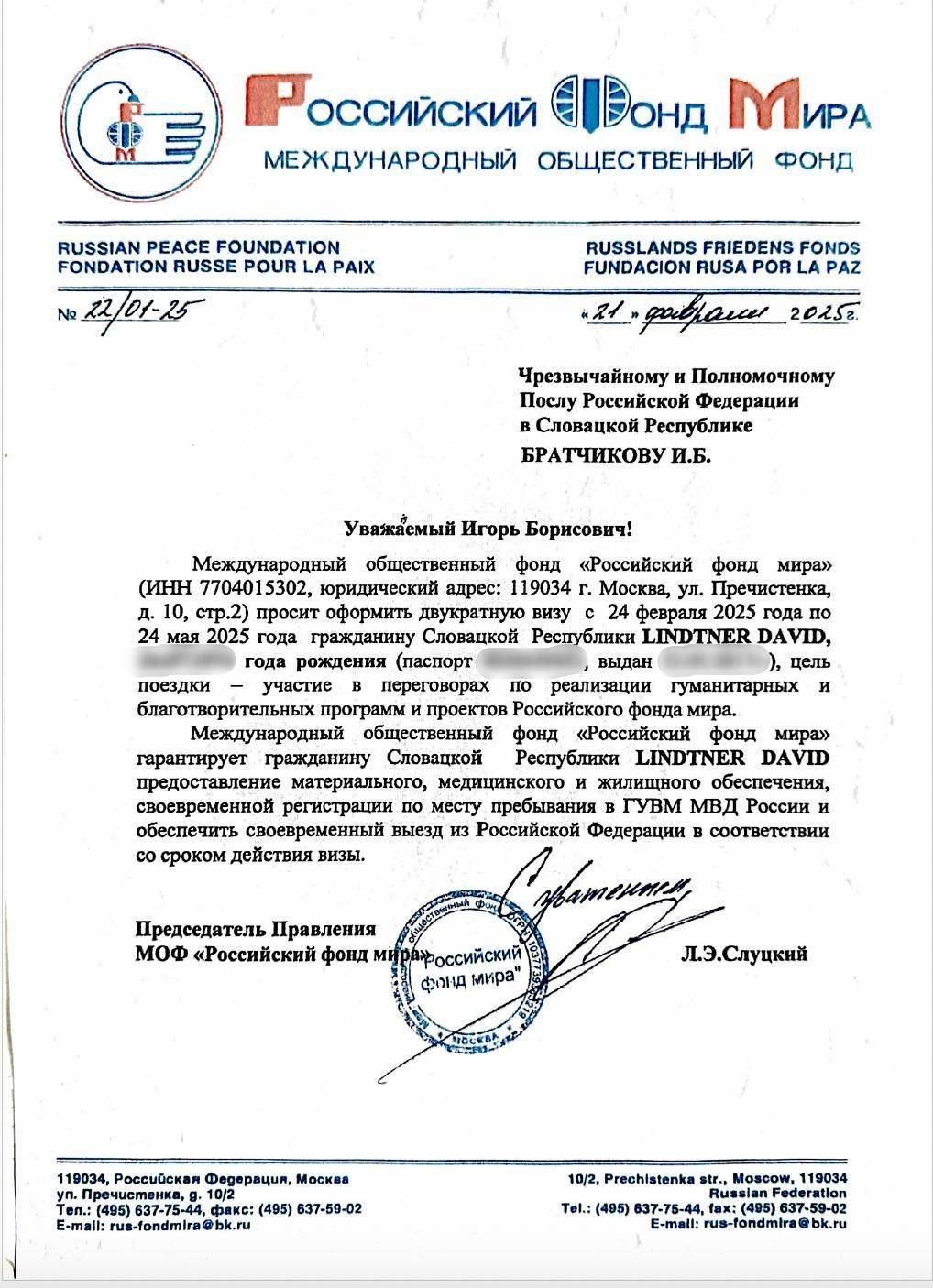
Letter from Slutsky to the Russian ambassador in Bratislava requesting a visa for David Lindtner. Source: VSquare
However, while Slutsky claimed in the visa application that Lindtner would take part in talks on humanitarian and charitable programs, Blaha omitted such information in his social media posts from Moscow. He only said that David Lindtner accompanied him as his attorney and as the legal advisor of Prime Minister Fico, and that, together with Lindtner, they planned to speak to Russian partners about abuses of the rule of law in Slovakia (alleged abuses committed by critics of the Fico government). There was no mention of the Russian Peace Foundation or Slutsky’s role in the visit.
A 2023 investigation by The Insider has found that the Slutsky-led Russian Peace Foundation routinely passes information about their foreign guests to the GRU. This was revealed through internal emails, including correspondence involving GRU’s 1st “European” department, which is engaged in espionage and recruiting agents abroad.
The GRU is “looking for politicians, military, intelligence officers, scientists, engineers working at defense companies, diplomats, and journalists. The GRU is interested in everything, from military and political secrets, to the latest technologies in the private sector,” The Insider wrote. Moreover, in September 2023, Slutsky received a commemorative plaque from the GRU’s 24th Special Forces Brigade—active in Syria and Ukraine—thanking him for his patriotism and service to Russia.
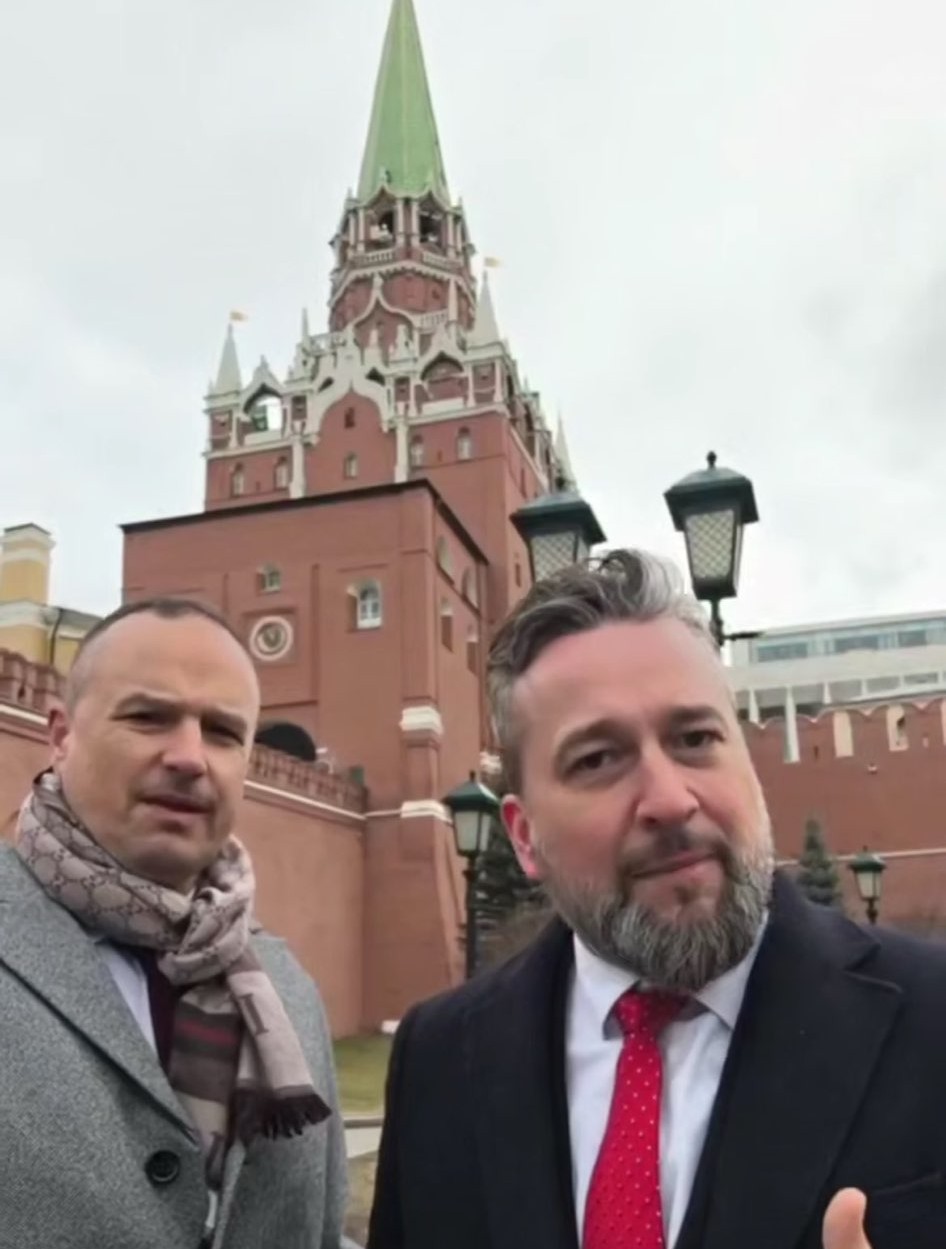
David Lindtner and Ľuboš Blaha in Moscow. Screenshot of a video, captioned “In the Russian parliament with the head of the intelligence service.” Posted on Ľuboš Blaha’s Telegram channel
Lindtner currently works in several roles in Slovakia—as an attorney, a legal advisor to Prime Minister Fico, and an advisor to the Minister of Justice Boris Susko. The Ministry of Justice claimed that Lindtner’s trip was unrelated to his role as an advisor to the ministry. The Government Office of the Slovak Republic, MEP Ľuboš Blaha, and David Lindtner himself did not respond to our questions.
Leonid Slutsky and the Russian Peace Foundation also did not respond to our requests for comment.
David Lindtner: From Judge to Controversial Government Insider
David Lindtner’s transformation from judge to controversial political operative reflects the troubling entanglement of law, politics, and scandal in Slovakia. Once president of Bratislava District Court III, Lindtner now holds several influential positions—despite facing serious criminal charges and maintaining documented ties to convicted criminal Marian Kočner.
Encrypted messages exchanged with Kočner—156 on WhatsApp and 224 on Threema—revealed Lindtner’s willingness to discuss sensitive judicial matters. In one exchange from November 2017, Kočner asked which judge “we should push on,” prompting a discussion about judges Zuzana Molnárová and Denisa Mészárosová—suggesting attempted interference in court cases. (In a reply to ICJK, the two judges claimed that they were not contacted or pressured by Lindtner.)
Even after Kočner became a prime suspect in the 2018 murder of journalist Ján Kuciak, Lindtner continued corresponding with him, mocking the investigation and Kuciak’s legal complaints (the journalist had filed a criminal complaint against Kočner, who threatened him via telephone call months before Ján Kuciak and his fiancé Martina Kušnírová were shot).
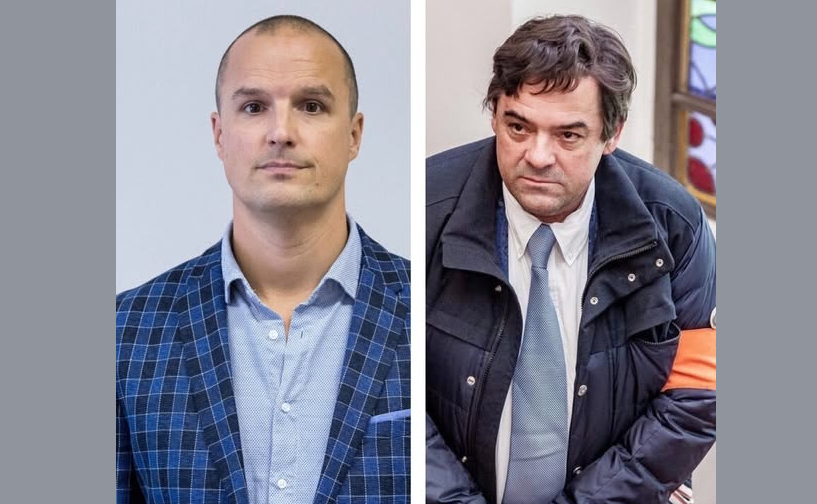
David Lindtner (left) and Marian Kočner (right). Source: Facebook of Slovak politician Juraj Šeliga in 2020
Lindtner’s own legal troubles began soon after. In Operation Storm, a Slovak investigation into criminal activities of judges, he was indicted on two counts of indirect corruption and interfering with judicial independence. In another investigation, called Operation Gale, he was charged with accepting bribes and meddling in court affairs. In 2024, a former gang member testified that Lindtner had accepted bribes from ex-intelligence officer Ľuboš Kosík about 15 years earlier—an allegation now under police investigation.
Despite resigning as a judge, Lindtner quickly rebounded. He became a legal advisor to Robert Fico, even defending him during a criminal investigation. Now, with Fico back as prime minister, Lindtner is officially employed as his legal advisor, earning €2,400 per month from the Slovak Government Office. He also advises Justice Minister Boris Susko (though without salary, the ministry told ICJK).
Notably, Lindtner co-authored the 2024 Penal Code reforms, which reduced punishments and shortened statutes of limitations for corruption and financial crimes—even while facing related charges himself. In response to ICJK’s request for comment, the Slovak Ministry of Justice stated that an “expert group” had been consulted for the amendments and that they “see no conflict of interest.” Meanwhile, Lindtner is also a partner in the law firm of Defense Minister Robert Kaliňák.
In March 2024, the ruling Smer party reportedly considered nominating Lindtner for General Prosecutor. But a legal reform widely seen as paving the way for that move was vetoed by President Peter Pellegrini and ultimately dropped.
The Man Who Brings European Politicians to Moscow
The “delegation” of Fico allies—including David Lindtner and Ľuboš Blaha— who visited Moscow in March 2025 met with several Russian officials under international sanctions, including Grigory Karasin, chief Russian negotiator in the Saudi-hosted peace talks with the United States, and Sergey Naryshkin, head of the Russian Foreign Intelligence Service (SVR). According to Blaha, the conversation with Naryshkin was “an intellectual experience,” and he emphasized that the meeting did not take place in secret, but rather in the official premises of the Russian Historical Society. This, he claimed, was meant to refute media allegations that labelled the encounter as an act of collaboration.
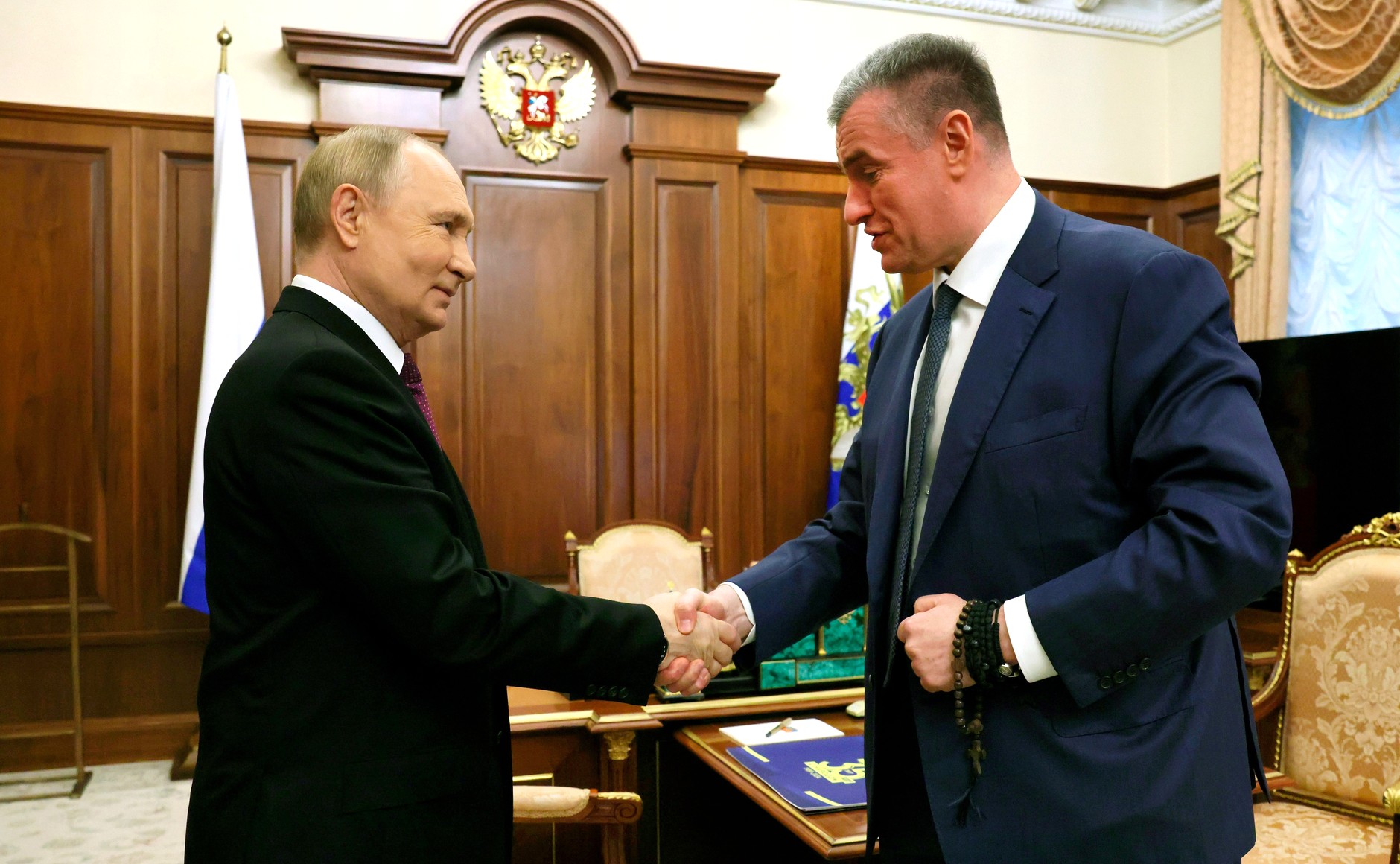
Vladimir Putin and Leonid Slutsky. Source: Kremlin.ru
They also met with several figures from Russian political life, including members of the State Duma and Russian Foreign Minister Sergey Lavrov, former president Dmitry Medvedev and Gennady Zyuganov, member of the State Duma and General Secretary of the Communist Party of the Russian Federation (CPRF). In his social media posts, Blaha assured the Russian side that “not everyone in Europe shares the West’s war rhetoric,” and that “Slovakia values its brotherly relations with Russia.”
Blaha also sharply criticized the European Union’s “progressive” political direction, claiming that the true enemies of peace are to be found in the West. There is no mention, however, of what exactly Lindtner was doing during the Moscow meetings, apart from Blaha’s statement that he acted as a legal advisor.
But we do know the activities of the man who brought Lindtner over to Moscow. Duma member Leonid Slutsky is not taken seriously as a diplomat in Russia or abroad, and he doesn’t have a relevant education. Amid tensions with the West, however, Slutsky has become a useful figure for the Kremlin. As he put it: “Parliamentary diplomacy can often take place where it is difficult for official diplomacy.” According to Meduza, he speaks foreign languages poorly—“but everyone understands him”. For example, it was at Slutsky’s invitation that Marine Le Pen, then leader of the French National Front (now: National Rally), visited Russia in March 2017, at a time when she was considered a strong contender in the upcoming French presidential election.
Slutsky invited Le Pen as chairman of the Russian State Duma’s Foreign Affairs Committee. During her visit, Le Pen reiterated her support for lifting EU sanctions against Russia, calling them “counterproductive,” and emphasized that “Crimea has always been Russian” and even that “there was no Russian invasion.”
It was in her capacity as a journalist covering Le Pen’s trip to Moscow that Farida Rustamova, a journalist for the BBC Russian Service, visited Slutsky’s office. According to her later account, once they were alone in his office, Slutsky began harassing her. In 2018, two more journalists—Ekaterina Kotrikadze (RTVI) and Darya Zhuk (Dozhd/TV Rain)—publicly accused Slutsky of harassment. Kotrikadze claimed that in 2011, Slutsky locked her in a parliamentary office and tried to kiss her. Zhuk reported that Slutsky agreed to give her an interview only if she went out to dinner with him afterward. The scandal did not result in criminal proceedings, but several media outlets boycotted his interviews.
Slutsky reacted to the accusations by saying that “the attempt to make me the Russian Harvey Weinstein is a vile provocation. From a business perspective, it’s hard to find fault with me, so they made up harassment.”
Both then-LDPR leader Vladimir Zhirinovsky and Communist Party leader Gennady Zyuganov credited Slutsky with successfully bringing foreign politicians to the annexed Crimean Peninsula. Zhirinovsky reportedly told Putin that while Russian diplomats and the entire Russian foreign ministry couldn’t achieve this, Slutsky succeeded.
Slutsky was also among the first to travel officially to Crimea—even before the pseudo-referendum unrecognized by Ukraine and the West—and was the first to be placed on U.S. and EU sanctions lists. “Nowadays, being under sanctions means you’re on Russia’s side,” Slutsky commented recently. “I was the first.” In 2016, Putin praised Slutsky by saying that “Leonid Eduardovich is a different type of person by nature [than Zhirinovsky]—more diplomatic.”

Robert Fico’s advisor David Lindtner (fourth on the left) at a meeting with Leonid Slutsky in Moscow. Source: https://lslutsky.ru/
In April 2021, Putin awarded the 4th Class of the Order “For Merit to the Fatherland” to Slutsky, “for his significant contribution to the development of parliamentarism, active legislative work, and many years of conscientious service.” In May 2023, he received the 3rd Class of the same state award from Putin, with the same justification.
After Russia’s full-scale invasion of Ukraine, Slutsky was part of the Russian delegation for peace talks in March 2022 which took part on the Belarus-Ukraine border and Turkey. In mid-March, Slutsky expressed hope for “convergence of positions” between Kyiv and Moscow, but his tone soon changed. After the death of Vladimir Zhirinovsky on April 6, 2022, Leonid Slutsky took over leadership of the LDPR and immediately radicalized the party’s rhetoric.
“Denazification, complete eradication, cleansing of the territory of Ukraine from neo-Nazism. This is not a process that can be reversed,” he said in May 2022, expressing confidence in the success of Russia’s “special military operation”. He also announced that the party was developing a political analysis system based on artificial intelligence called the “Zhirinovsky Algorithm,” aimed at preserving the ideology of “one of the most significant leaders in Russian political history.”
Meanwhile, Slutsky has repeatedly been embroiled in controversy. Among all Duma deputies, he holds the record for the highest number of speeding violations—825 infractions between June 2017 and March 2018. Slutsky’s name has also come up in multiple anti-corruption investigations. Alexei Navalny’s Anti-Corruption Foundation (FBK) uncovered one hectare of undeclared land in the elite Rublyovka area, as well as several luxury cars—each costing more than two to four times a deputy’s salary.
Slutsky’s family’s extravagant spending was also brought to public attention by TikTok users in 2021—his daughter, Lida, was 11 years old at the time, and, based on her posts, journalists were able to calculate that the family likely spent a year in a luxury villa in Turkey. According to reports, such a villa costs $2,600 per day.
Slutsky and Slovakia
Leonid Slutsky has long been involved in Slovak–Russian relations. After Slovakia expelled Russian diplomats in August 2020 and again in April 2021, Slutsky denounced Bratislava’s actions as a “provocation” and vowed swift retaliation. In the latter case—when Slovakia expelled three Russian diplomats in solidarity with the Czech Republic over the 2014 Vrbětice ammunition depot explosion, attributed to Russian GRU agents—Slutsky accused Slovakia of “voluntarily entering vassalage to the USA” and dismissed the expression of solidarity with Prague’s “schizophrenic accusations” as “nonsense.” A week later, Moscow followed up by expelling Slovak diplomats.
Slutsky also weighed in during Slovakia’s Sputnik V vaccine controversy in 2021. After Slovakia halted the use of Sputnik V and returned the unused doses, Slutsky blasted the move as an example of politics overriding public health. He noted that Slovakia had used up its initial batch—arguing this implicitly proved the vaccine’s efficacy—and said that the decision to abandon Sputnik was driven not by concern for public welfare but by “blindly following Brussels’ course.” He accused the EU of pressuring Slovakia to reject a working vaccine in favor of more expensive Western alternatives.
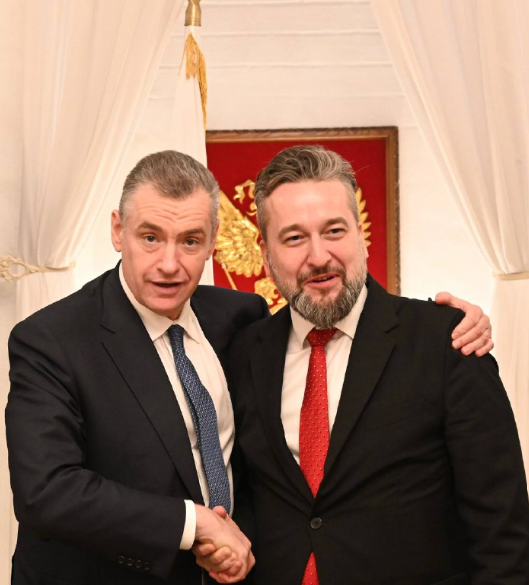
Leonid Slutsky and Ľuboš Blaha. Source: Telegram channel of Slutsky
After Russia’s full-scale invasion of Ukraine, Slutsky—by then leader of the LDPR—echoed then-opposition leader Robert Fico’s criticism of Slovakia’s government. In 2023, the previous Slovak administration had sent Soviet-era MiG-29 fighter jets to Ukraine. In early 2024, after the change of government, members of Fico’s incoming cabinet scrutinized the transfer and even suggested it amounted to “treason” against national security. Slutsky welcomed this stance, calling the transfer “unlawful” and damaging to Slovakia’s interests. He praised the cabinet’s audit, saying it rightly labeled the move treasonous and cited it as evidence that “sound political and public forces in Europe” recognize the dangers of Washington and Brussels’ push to escalate the Ukraine conflict.
In May 2024, after Fico was wounded in an assassination attempt, Slutsky condemned the attack as a “true atrocity,” suggesting it was likely motivated by Fico’s political views being incompatible with the “hegemony and double standards of the collective West.” Posting on Telegram, Slutsky invoked the phrase “cui prodest” (“who benefits?”), implying Western actors may have had an interest in silencing Fico.
Slutsky has also engaged in direct diplomacy with Slovak lawmakers from Robert Fico’s governing coalition. In January 2025, he hosted a high-level Slovak parliamentary delegation in Moscow. The group, led by National Council Vice-Speaker Andrej Danko (chairman of the Slovak National Party), spent three days in Russia meeting with officials to strengthen bilateral ties. On January 13, 2025, during the delegation’s visit to the Duma, Leonid Slutsky was photographed alongside Danko, Smer MP Tibor Gašpar, Deputy Duma Chairman Alexander Babakov, and Slovak Ambassador Peter Priputen, underscoring Slutsky’s central role in Slovak–Russian talks.
“For several years, party leaders and political consultants talked about turning Slutsky into a kind of James Bond figure — a high-status, tight-lipped fixer-diplomat,” a recent Meduza piece quotes an LDPR insider as saying. According to Meduza, the Kremlin is also considering a proposal to rebrand the LDPR as the “party of diplomacy.” The idea, championed by Slutsky, would position the party to build ties with foreign far-right and pro-Russian groups, pending approval by Putin’s political team led by Sergey Kiriyenko.
Meanwhile, The Insider’s 2023 investigation into Leonid Slutsky’s ties to Russian military intelligence revealed that his Russian Peace Foundation primarily shared information about French citizens with the GRU. However, the leaked files also included data on individuals from the U.S., Canada, Belgium, Spain, Italy, Slovenia, India, Brazil, Israel, and several African countries. These files contained screenshots of dozens of passports belonging to foreign scientists, university professors, public figures, and religious leaders.
At the time of the investigation, no Slovak citizens were said to be identified among the targets.
This article was written in collaboration with the Investigative Center of Ján Kuciak (ICJK). Read their article in Slovak here, and their profile of David Lindtner here.
Subscribe to “Goulash”, our newsletter with original scoops and the best investigative journalism from Central Europe, written by Szabolcs Panyi. Get it in your inbox every second Thursday!
VSquare’s Budapest-based lead investigative editor in charge of Central European investigations, Szabolcs Panyi is also a Hungarian investigative journalist at Direkt36. He covers national security, foreign policy, and Russian and Chinese influence. He was a European Press Prize finalist in 2018 and 2021.
Tomáš Madleňák is a Slovak journalist who has worked for the Investigative Center of Ján Kuciak since 2020. He is based in Bratislava.

